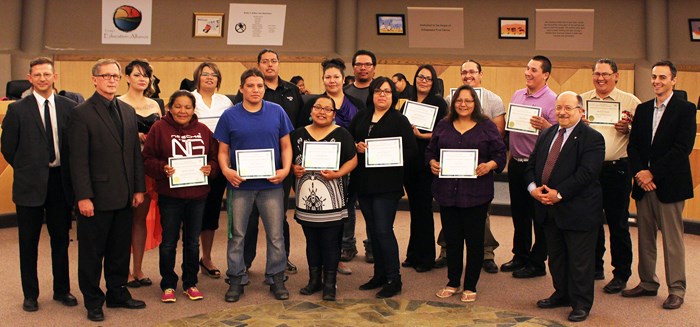A group of Parkland College students was celebrated in Fort Qu’Appelle on Thursday as their mining readiness course winds down. Fifteen students in the Introduction to Mining program have completed 22 weeks of classes, safety training, and skills preparation in the Fort Qu’Appelle area. They will be on work placements May 20-29 to complete the course.
The introductory program is part of a multi-year agreement signed last July between Parkland College, Carlton Trail College, and International Minerals Innovation Institute (IMII). The Essential Skills project aims to give the Aboriginal students a solid foundation upon which to build their skills and to prepare them for work in Saskatchewan’s mining industry. Six of the students have already received employment offers.
The Introduction to Mining program, funded by IMII, has the colleges working together with a number of companies to develop an Aboriginal workforce for potash mines and processing facilities. The students, who come from seven First Nations bands in the Parkland region, have toured three mines in this program: Mosaic’s underground operation at Colonsay, K + S Potash’s solution mine near Bethune, and PotashCorp’s underground mine at Lanigan. Each company provides a unique work culture with different career opportunities.
In this project, students received certification in two separate training programs: Building Environmental Aboriginal Human Resources (BEAHR) Environmental Monitoring and Mining Industry Human Resources Council (MiHR) Mining Essentials.
BEAHR Environ-
mental Monitoring, developed by Environmental Careers Organization Canada, was delivered over seven weeks. The program focuses on understanding environmental issues, government regulations, monitoring effects, risk management and mitigation measures, sampling protocols and basic research, mapping, and journaling. An Aboriginal cultural component ran throughout the program.
MiHR’s Mining Essentials lasted 10 weeks. It focused on the essential skills profiles in MiHR’s National Occupation Standards for entry-level occupations and combined work readiness skills as defined by a development committee of industry, Aboriginal organizations, and education experts. Further exploration of a career in the mining industry included the potash mine tours, guest speakers, and visits from recruiters.
Mining is a vital, growing component of Saskatchewan’s economy as well as Canada’s economy. But like many economic sectors across the country, the growth of the province’s mining industry is threatened by human resources challenges. There is a need to educate individuals to the many mining careers that are available. Additionally, proper training is required to prepare individuals for entry level jobs to skilled and professional jobs available through the mining cycles.
Aboriginal people offer the potential of a strong workforce in Saskatchewan. This project offers Aboriginal people the foundational training required to be successful in skills training. They receive safety training and environmental monitoring skills that will help them better understand the environmental impact issues facing mines and First Nations communities.
This project is one of eight being rolled out by IMII with a focus on safety, environment, and developing specialized training for the mining industry.



